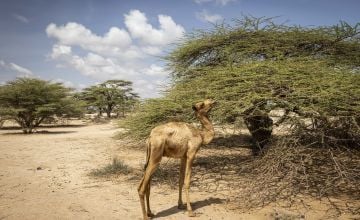
Read our 2023 annual report

Knowledge Hub
Yet another report on climate change is about to be released, but why is this one different?

The words ‘climate change’ and ‘report’ might prompt feelings of fear, confusion and apathy, all of which we can empathise with. Of the hundreds of climate reports released last year, none of them painted a particularly positive picture. Not to mention the disappointing outcome of COP26 that took place in November last year.
Therefore, the fatigue surrounding yet another climate change-related report is entirely reasonable. However, the report from the Intergovernmental Panel on Climate Change (IPCC) due to be released in February 2022 is different, and here’s why.
Why is this report different?
The February report focusses on impacts, adaptation and vulnerability in relation to climate change. It will provide both a global and regional understanding of the changes so far, future risks and options to reduce the risks for humans and eco systems. It will also look at climate change in the context of culture, values, ethics, identity, behaviour, historical experience, and knowledge systems (e.g., indigenous and local). Fascinating stuff.
However, if you’re not sold yet, the report will also highlight how we are currently adapting to climate change and what adaptation responses may exist in the future. Instead of all gloom and doom, we’re finally getting tangible, actual, real solutions, as well as a hint towards a brighter future: a world that looks much less like Dune or Waterworld. Phew!
Why are we so interested?
Climate change significantly increases the number of natural disasters and plays a significant role in many conflicts, becoming a major driver of migration and displacement. The deepening climate crisis and related environmental destruction is also contributing to land degradation and food insecurity. Climate change could push 122 million more people, mainly farmers, into extreme poverty by 2030. Moreover, women are disproportionately affected by climate change, and as gender inequality is one of the biggest barriers to ending extreme poverty, this makes climate change a significant poverty multiplier.
However, climate change is not only an issue of environmental conservation, but also of justice and human rights. It is those who have contributed least that are likely to feel the effects most significantly. Climate vulnerability depends not only on the impacts of climate change on a country or community, but on their ability to deal with these impacts. In many of the countries in which we operate, poorer communities do not have the means to adapt to floods and other natural disasters; and in many cases, their livelihoods tend to be based on climate or weather-sensitive sectors such as agriculture, which makes them all the more vulnerable.
Therefore, much of our work on climate change is around adaptation within the most vulnerable communities – which is why we’re particularly excited about this report.
What is the IPCC and what exactly does it do?
The IPCC is the UN body for assessing the science behind climate change. Every six or seven years, they publish extremely comprehensive scientific reports, which political leaders consider when making decisions concerning climate change.
These assessments are a key input into the international negotiations to tackle climate change, meaning they’re kind of a big deal.
The most recent report, completed in 2014, provided the main scientific input to the Paris Agreement (where 196 state parties announced commitments to reduce their greenhouse gas emissions and to support adaptation efforts). Despite a certain country’s *cough America* abandonment, the Agreement has solidified political resilience; normalised 1.5 degrees as the limit for the rise in global temperature; and has shifted a number of sectors towards clean energy. Good work! Although it certainly didn’t achieve everything it set out to do.
In 2016, the IPCC agreed to produce three Special Reports, a Methodology Report and Assessment Report 6. The three Special Reports were published in 2018 and 2019. The Assessment Report 6 was split into three parts, one of which was published last August, focussing on the science behind climate change. This report established these now widely accepted climate change facts:
- Climate change is real and human activities are the main cause.
- The concentration of greenhouse gases in the earth’s atmosphere is directly linked to the average global temperature on Earth.
- The concentration has been rising steadily, and mean global temperatures along with it, since the time of the Industrial Revolution.
- The most abundant greenhouse gas, accounting for about two-thirds of greenhouse gases, carbon dioxide (CO2), is largely the product of burning fossil fuels.
The other two reports are expected in February and March of this year.
Other ways to help
Corporate support
Is your company interested in working together for a common cause?
Fundraise for Concern
From mountain trekking to marathon running, cake sales to table quizzes, there are lots of ways you can support our work.
Buy a gift
With an extensive range of alternative gifts, we have something to suit everybody.
Leave a gift in your will
Leave the world a better place with a life-changing legacy.
Volunteer with Concern
The lots of ways to get involved with our work as a volunteer
School fundraising
Without the generous support from schools, we wouldn't be able to do the work that we do.




